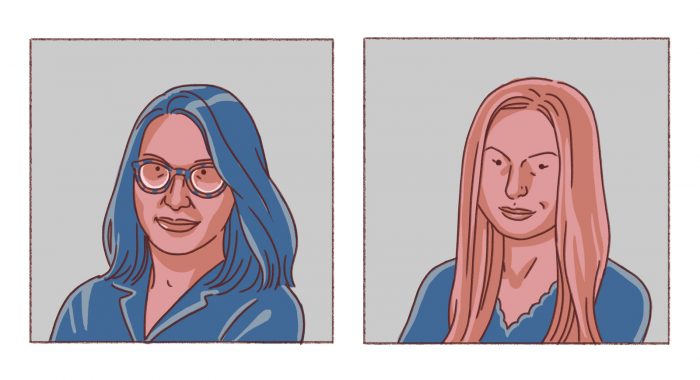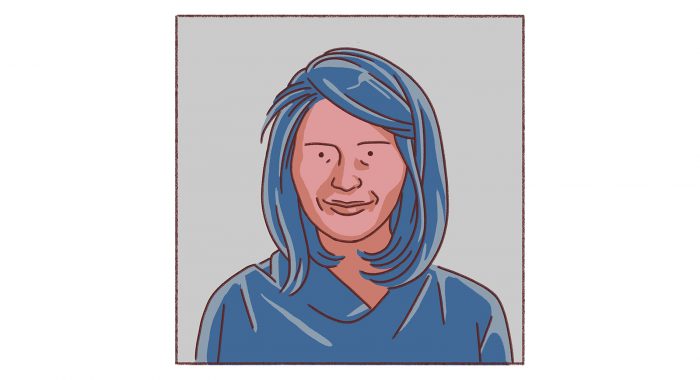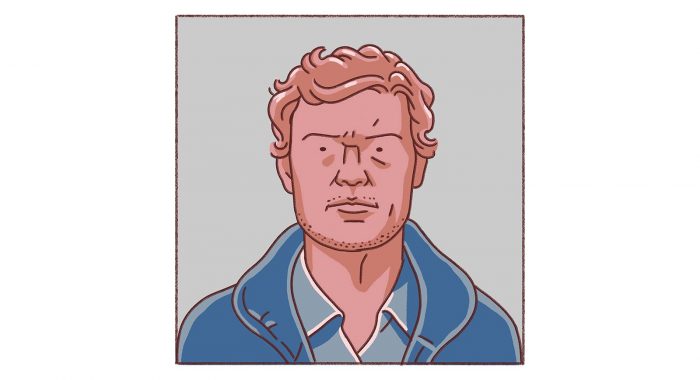Lulu Miller: How to become Batman, an audio story about a blind man who uses echolocation to navigate the world that examines the surprising effect our expectations can have on the people around us. A Peabody-winning science journalist and co-founder of the groundbreaking podcast Invisibilia, Lulu Miller’s audio stories focus on mental health, disability, and nature. “The process of interviewing and editing tape is not unlike the joyously grueling task of primary-source research: combing through hours of tape in search of the rare gems—emotion, humor, surprising scene details—that deepen a story.”
Jacqui Banaszynski: It’s impossible to talk about Jacqui without mentioning she was a Pulitzer Prize finalist in 1986 (with a heartbreaking piece about the Ethiopian famine) and then won the coveted award in 1988 for a three-part in-depth story about a gay couple dying of AIDS in rural America. Her reporting brought a whole new, intimate perspective into the life of LGBT couples and into the AIDS epidemic that ravished the country in the 80s. Try also her 2017 speech at The Power of Storytelling:
Lisa Taddeo, a two-time Pushcart Prize winner and bestselling author, drove across the United States six times over the course of eight years and spoke to hundreds of women about their deep desires and needs. The result is a nonfiction literary masterpiece, Three Women, which offers intimate access to their emotional and erotic lives and tries to understand why we judge women for being hungry for connection and intimacy. The book is built around the life stories of three ordinary women whose experiences are easy to relate to and paint a remarkable portrait of female desire.
Evan Ratliff: The story of Paul Le Roux, a computer programmer turned drug kingpin with the help of the Internet, and the leading character of Evan’s latest book, The Mastermind: Drugs, Empire, Murder, Betrayal. Before you read the book, which will be translated into Romanian, listen to this Reply All episode for a summary and to find out how exactly Paul Le Roux turned into a criminal mastermind.
Jonathan Gottschall: Why Storytelling is The Ultimate Weapon, an essay about the power of stories and the human need for emotion. “In fact, fiction seems to be more effective at changing beliefs than writing that is specifically designed to persuade through argument and evidence” says Gottschall, who wrote The Storytelling Animal: How Stories Make Us Human, a book which analyses our deep connection to storytelling and was a New York Times Editor’s Choice Selection and a finalist for the LA Times Book Prize. The book will also be available at the conference.
Jennifer Brandel’s insight on one of the most common dilemmas the media deals with: Give the audience what they want or what they need? She says there’s an even better question: “What does our community not know that we could help them find out and understand?” To answer this question, journalists have to start by listening to their audience, says Brandel, named one of 30 World-Changing Women 2018 in Conscious Business.
Tatiana Țîbuleac: Read an interview about Tatiana’s career path, her writing process, language and identity and how they’re reflected in her books. A writer and former reporter, born in Republica Moldova. Tatiana is the author of two acclaimed novels, Vara în care mama a avut ochii verzi (The Summer in Which Mother had Green Eyes), who tells the story of a dying woman and her son who are spending their last summer together in a French village, and Grădina de sticlă (The Glass Garden), winner of the European Union Prize for Literature.
In 2010, Aaron Lammer, together with Max Linsky, started Longform.org, a platform that curates the best classic and new nonfiction writing from all around the web, which grew into one of the most valuable resources for writers, reporters. It was also the starting point for the Longform podcast, a series of in-depth interviews on journalists’ and writers’ work. Get to know Aaron as the host of the Longform podcast in this episode with former Vice News correspondent Thomas Morton.
Max Linsky, co-host of the Longfrom podcast, thinks that much of what makes him a good interviewer is that he actually cares. “It’s just rare to get to sit down with someone and ask them what you really want to know,” he says, so he always tries to make the best out of it, even if that means making a fool out of himself in an attempt to get his guests to think out loud. Discover him in this episode of the Longform podcast where he talks to American author, academic, and journalist Elif Batuman – a fascinating experience for Linsky and one of the most fun interviews he’s ever done for the show.
Lucia: Listen to Catastrophe, a song from the most recent album of Lucia, one of Romania’s most distinctive voices, of which she says is among those dearest to her. In putting it together she experimented both with the way she writes music, but also with how she uses her voice. „I let go of all the inhibitions”, she says, choosing to show herself, as a person and as an artist. The core of this song is about something we all struggle with: even though some people may sometimes consider you a catastrophe (“a walking disaster”, as Lucia says of herself), you know what’s inside, and what drives you.
Luke Dittrich: The brain that couldn’t remember, an adaptation of the
award-winning New York Times bestseller „Patient H.M.: A Story of Memory, Madness and Family Secrets”, which explores the scientific, ethical, and human dimensions of one of the darkest and most important case studies in the history of medicine. Luke tells the story of a risky neuroscience experiment in the 60s which his grandfather, a prolific lobotomist, conducted for a decade, in an attempt of also saving his own wife, who was struggling with a mental illness. One of the lessons Luke learned while writing this story was that we understand more and more about how memories change over time.
Lipi Roy: Read this story about the complicated journey of the incarcerated women Lipi Roy met at Rikers Island, when she was Chief of Addiction Medicine for NYC jails, to understand why she says they would be better off receiving rehabilitation in the community rather than being locked up in a criminal justice system created by men, for men. Lipi is a physician with special interests in addiction, nutrition, and mindfulness, but her passion for health goes beyond the borders of her professional life. She uses social media and writes articles as a way to reach more people and teach them about healthy living.
Kate Samworth: Aviary Wonders, Inc. (2014), an illustrated book that imagines a scenario where birds are extinct and a company has the idea of selling beaks, wings, and legs which can be assembled of one wishes. Kate, a visual artist based in Maryland who enjoys extracting fantastic worlds out of the real one, gets her ideas from “traveling, looking at art, reading, and day-dreaming”: she did voluntary work for organic farms, she goes bird-watching, she did a tour of Europe as a bass player in a punk band. Read an interview with the artist and discover some of her works, here.
Aaron Wickenden: Hail Satan?, a controversial comedy that premiered in competition at Sundance Film Festival this year and is currently in theatrical release in the US. The film traces the rise of The Satanic Temple, one of the most controversial religious movements in American history, and in April was featured in New York Times’ Critic’s Pick section. Hail Satan? offers a timely look at a group of often misunderstood outsiders whose commitment to social and political justice has empowered thousands of people around the world. Aaron Wickenden is a multiple Emmy and ACE Eddie (American Cinema Editors) nominated documentary editor with nearly two decades of film experience.
Ann Marie Lipinski: When Women Stand Up Against Harassers in the Newsroom, an insightful piece that talks about the misogyny culture in journalism and how to create workplaces that truly support women. “The fix is not sexual harassment training, but more people in leadership who already know better”, writes Lipinski, who became, in 2001, the first woman editor of The Chicago Tribune, at a time when men held most of the leadership roles in newspapers around the country. Lipinski, currently the curator of the Nieman Foundation for Journalism at Harvard University, was part of a reporting team that investigated the corruption and conflicts of interest in the Chicago City Council, for which the team won a Pulitzer Prize in 1987.
Ioanida Costache: Light Upon, a video portrait of Nicu Ciotoi, Ioanida’s violin teacher and a well-known Romani violinist born in 1950, whose old songs had the power to narrate centuries of Roma history, oppression, and discrimination. Ioanida, a musician, videographer, and Roma activist that works to unravel a song-story tightly wound to Romani music, asked him to teach her to play the violin like a true lăutar. The documentary tells both Nicu Ciotoi’s story of how he learned to play the violin from this father and grandfather and Ioanida family’s story and her search for finding their roots and understanding what music meant to them.
Patrick Brăila: What it means to become a man? How can you re-define yourself in a society where we are used to hide complicated things about ourselves? Watch Patrick Brăila TEDx speech; Patrick is one of the best-known activists of the transgender community in Romania. He is a film director and a co-president of ACCEPT, one of the main NGOs fighting for LGBTQ+ rights. In 2014 he came out as a transgender man and since then he’s been helping young people and their parents go through the transformation process, from emotional to medical aspects.
Robin Kwong: Check out this list of newsgames Robin compiled on his website last year, including both FT work such as The Uber Game or Dodging Trump’s Tariffs, and games from other creators. Try your hand at coming face to face with Brexit, pirate fishing, the rental market or the challenges of going about daily life as a wheelchair user, and see how this interactive form of journalism presents key topics. Robin, head of digital delivery at the Financial Times who explores innovative storytelling methods that often blend journalism with games or art, bets you’ll be more empathetic and have a better understanding of the issues presented than after reading a text-based story.



